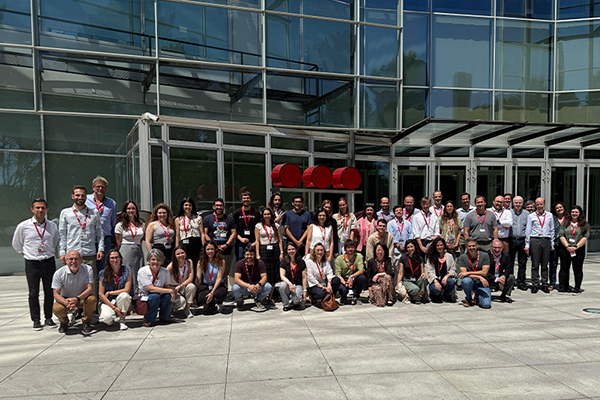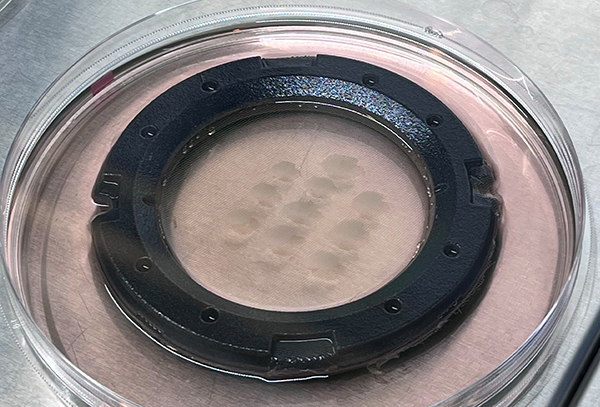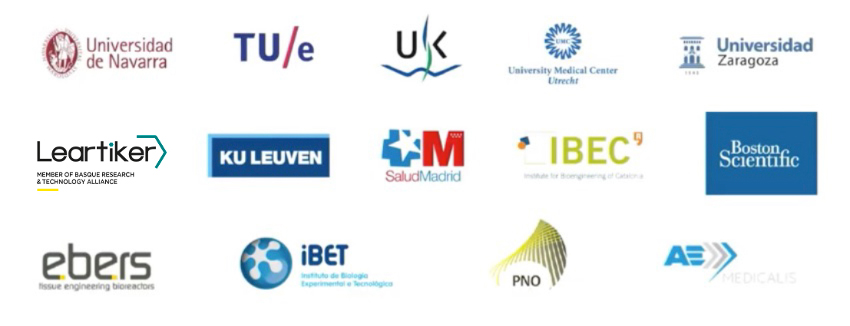Ambitious European BRAV3 project to develop a biological ventricular assist device ends successfully
The European project aimed at developing a personalised biological ventricular assist device has come to an end, marking an important milestone in tissue engineering and regenerative medicine. The last consortium meeting was held in Madrid on 28 May, bringing together 14 partners from 6 European countries, including universities, hospitals, technology centres and companies from the biomedical sector, in a high-level scientific collaboration.
The main objective was to create a personalised, human-sized functional tissue that can be integrated into the damaged heart and provide lasting mechanical and functional support. To this end, the consortium has manufactured from stem cells, and scaffolds printed by Melt Electrowriting (MEW), an advanced and personalised biological tissue (BioVAD) that is introduced into a bioreactor to undergo in vitro maturation. The bioreactor is one of the major breakthroughs of this European initiative and has been developed by the most technological members of the project, including Leartiker. This medical device offers a new maturation method with a mechanical and electrical stimulation system, as well as a culture system where culture parameters and conditions can be controlled without the use of an incubator.

A multidisciplinary European collaboration
The success of this project has been made possible by a deeply multidisciplinary and collaborative approach, combining fields such as bioengineering, cell biology, cardiac surgery, materials science, advanced manufacturing and clinical transfer. Each of the partners has contributed expertise at different stages of development, from basic research to pre-clinical validation. This synergy has been key not only to achieving the scientific and technological objectives, but also to strengthening joint innovation capabilities and accelerating progress towards real clinical applications.
The project, funded by the European Union's Horizon 2020 research and innovation programme, has been led by the Clínica Universitaria de Navarra and has involved institutions such as TU Eindhoven, KU Leuven, Universität Würzburg, University of Zaragoza, UMC Utrecht, Boston Scientific, IBET, IBEC, EBERS, SERMAS, AE Medicalis, and the consultancy PNO. This network has made it possible to combine expertise in bioengineering, cell biology, advanced materials, cardiac surgery and technology transfer.
Leartiker's role
Since the beginning of the project, Leartiker has led key tasks such as the design and development of the bioreactor for tissue maturation under electrical and mechanical stimulation, and has collaborated with other partners in the design of the BioVAD prototype developed within the project. The technology centre has participated in the validation of the matured tissue on a small scale, demonstrating the viability of the concept, and is currently in the process of maturing tissue on a human scale, with the hope of laying the foundations for future transfer to clinics.

Outstanding results and scientific publications
During the development of the project, numerous scientific articles have been published detailing the advances in the fabrication of the tissue, the design of the device and the preclinical tests. The results have also been presented at international congresses and technical dissemination has been promoted through the web and specialised media.
In addition to very promising results, the Leartiker Technology Centre and the University of Navarra (UNAV) have applied for a patent for one of the medical devices developed within the project: The Bioreactor chamber for the growth and/or maturation of tissue and method for the growth and/or maturation of tissue in a bioreactor chamber.
Future perspectives
The results obtained open a promising way towards new therapeutic solutions for patients with chronic heart failure. The knowledge generated during the project will serve as a basis for further research and projects to deepen personalised medicine applied to cardiac regeneration.
"This project demonstrates how collaboration between science, technology and industry can lead to transformative solutions for complex medical problems", said Ane Miren Zaldua, head of Leartiker's Health area.
This is another step forward that will enable the solutions developed to be transferred to the market so that society can benefit from the innovations and advances that are emerging thanks to collaborative projects such as this one.
More information: www.projectbrave.eu

This project is funded by European Union´s Horizon 2020 research and innovation programme under grant agreement 874827


